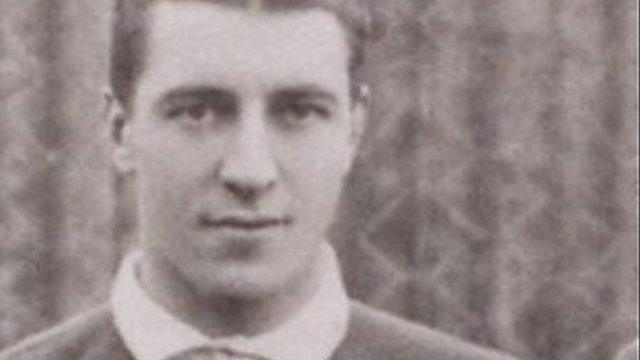World War One: Bravery of South Wales Borderers remembered
- Published
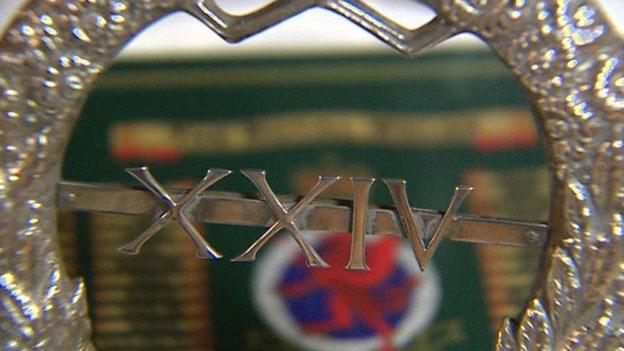
An annual dinner marks the regiment's exploits
It isn't often the regimental silver comes out these days.
It is, after all, 45 years since the South Wales Borderers ceased to exist as a separate entity. But Gheluvelt Day is special, a day when veterans of the regiment recall the glories and sacrifices of those who went before them.
Every year they get together for a dinner. This year's was at Blackwood Rugby Club. Medals shone, a bugler played, diners took their places to Men of Harlech played by bandsmen of the Royal Welsh Regiment.
"Gheluvelt ranks alongside Rorke's Drift in the regiment's history," said Dennis Pitman a former South Wales Borderer, now chairman of the Islwyn Branch of the Royal Welsh Regimental Association.
"In the regiment it was always a day we celebrated," he said. "The Borderers stand there was crucial."
Armistice Day this year falls at the centenary of pivotal events in the course of World War One.
The war was then just months old and still a largely mobile conflict; the lines of trenches from the sea to Switzerland had yet to be dug.
From the early retreat at Mons, the small British Expeditionary Force (BEF) had fought through the "Miracle of the Marne", where the seemingly unstoppable German army was turned, to the stalemate of the Battle of the Aisne.
From the hills of northern France, the BEF found itself in a place few of the soldiers, or their loved ones back home, would have ever heard. That place was called Ypres.
It became known as the race to the sea. An attempt by Germany to achieve a decisive victory. In the third week of October they attacked.
At Zandvoorde a battalion of Royal Welsh Fusiliers was all but wiped out. At Gheluvelt it appeared the German army would achieve the breakthrough it was seeking.
The village was defended by soldiers from among others the South Wales Borderers, The Welsh Regiment and Scots Guards. By mid morning the Borderers were just about the only troops holding out. That stand and a bayonet charge by the Worcestershire Regiment saved the day and perhaps the war.
The assessment of David Hughes from the south Wales branch of the Western Front Association is stark.
"The defence of Gheluvelt by the BEF was vital to keep the Germans out," he said.
"If Gheluvelt had fallen it is possible the war would have been over fairly quickly and the BEF would have been if not annihilated but encircled completely and would have had to more or less surrender."

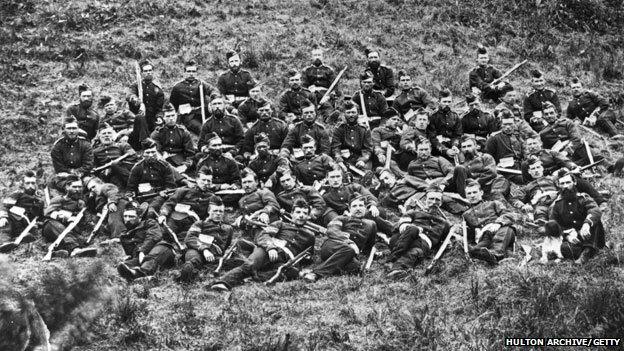
The remainder of B company of the South Wales Borderers after Rorke's Drift in 1879
SOUTH WALES BORDERERS' HISTORY
The regimental history of the South Wales Borderers goes back to 1689. Then it was called the 24th Regiment of Foot
The regiment fought at Blenheim, Talavera and the South African Wars
At Rorke's Drift, made famous by the film Zulu, seven soldiers from the regiment were awarded the Victoria Cross
In 1881, the regiment was renamed the South Wales Borderers. A reorganisation in 1969 saw the SWB merge with Welch Regiment (renamed from the Welsh Regiment) to form the Royal Regiment of Wales
On St David's Day 2006 the Royal Regiment of Wales was amalgamated with the Royal Welch

Contemporary reports say the British forces were outnumbered 10 to one. That is certainly an exaggeration but in their stand the Borderers saw 80 men killed and four times that number wounded. There will have been many acts of bravery that day.
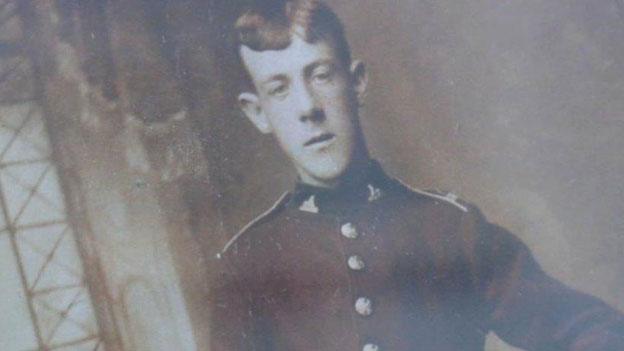
Jack Dunn rescued 11 injured soldiers
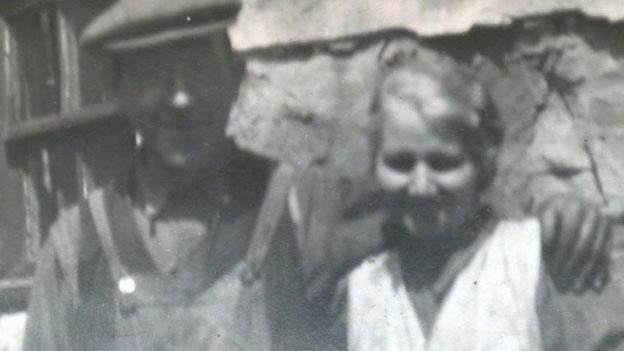
There was no recognition of Jack's bravery, as no officers witnessed it
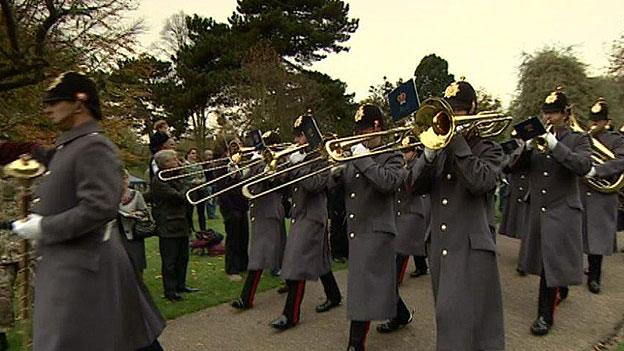
A parade in Worcester marking the Battle of Gheluvelt
Dowlais-born Jack Dunn's is among the most remarkable. Under heavy gunfire he returned time and time again to rescue 11 wounded comrades. He never spoke of it. Jack's family only found out what he had done from letters discovered after his death.
Mr Dunn's granddaughter Carole Leyshon takes up the story.
"Reading the letters there was a lot of confusion there, there were a lot of injured and he just saw the injured men," said Ms Leyshon.
"Nothing else was in his mind and he ran and got the one injured man back and then back and fore until he rescued 11 people."
Letters were written to the high command to try to win Jack recognition. Many believed he deserved a Victoria Cross. But no medals were awarded. With so many of the Borderers' officers dead or wounded none had witnessed his heroism.
'Spur of the moment'
"Nothing happened at all because there was no officer present," said Ms Leyshon.
"Maybe if my grandfather had pushed and done something himself he'd have had more recognition. But obviously he didn't, he didn't want recognition for it. It was something he did on the spur of the moment. If we hadn't found the records we would never have known."
All but a handful of those killed at Gheluvelt are remembered on the Menin Gate in Ypres. The memorial is to those who have no known grave. The war had already claimed tens of thousands of lives but it was to carry on for four more years.
- Published25 October 2014
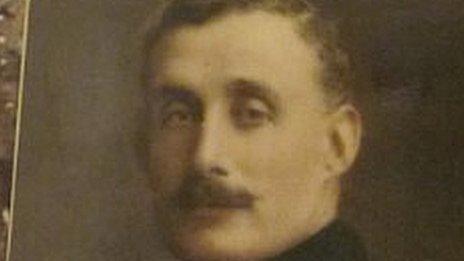
- Published24 August 2014
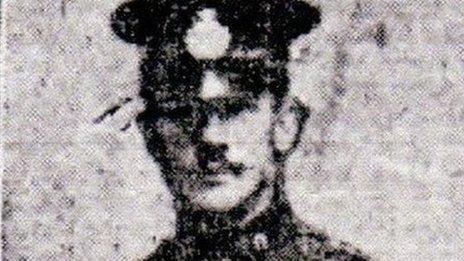
- Published15 August 2014
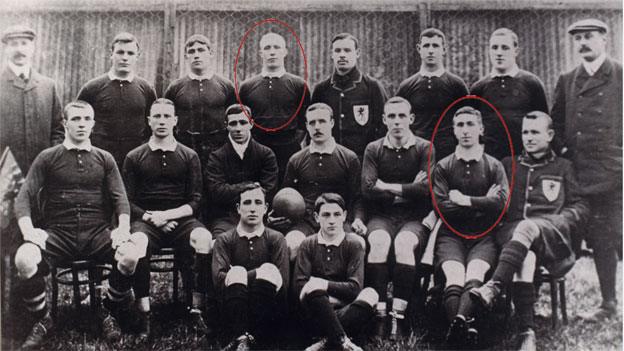
- Published28 November 2013
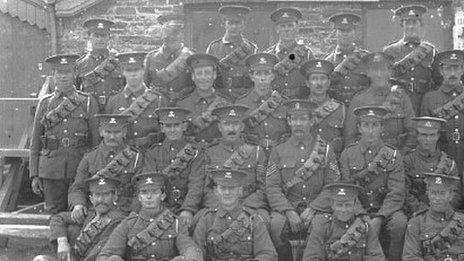
- Published14 August 2014
